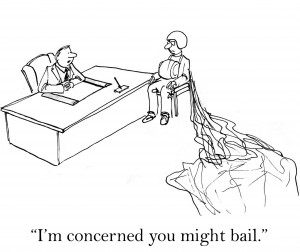 How does a California employer prevent its business from walking out the door along with a departing employee? In most jurisdictions, the employer could have the employees sign a non-compete agreement. Not in California.
How does a California employer prevent its business from walking out the door along with a departing employee? In most jurisdictions, the employer could have the employees sign a non-compete agreement. Not in California.
One of the notorious employment laws that separates California from other states is its long-standing prohibition of employee non-compete agreements. California’s strong public policy against non-competes not only affects local employers, but it often complicates efforts of multi-state employers to utilize uniform restrictive covenants–such as non-competes and non-solicitation provisions–with its employees. Here is a brief recap:
Non-Competition Agreements:
Most States: Most states enforce agreements where employees agree not to compete with their former employer for a reasonable period after employment, within a reasonable geographical area.
California: In California, even narrowly drawn restraints are contractually invalid, unless they fall within the specific statutory exceptions, such as agreements in connection with the sale of a business.
Customer non-solicitation provisions:
California: California significantly limits the use of customer non-solicitation provisions and will likely prevent enforcement of a contract clause purporting to ban a former employee from soliciting former customers to transfer their business away from the former employer to the employee’s new business.
Employee non-solicitation provisions:
California: The California ban on non-compete agreements can extend to “no hire” agreements between two businesses. While some California courts still enforce non-solicitation of employees provisions, “no hire” agreements are not enforceable.
No “blue-penciling”
Many States: Many states permit the modification or “blue-penciling” of overly broad restrictive covenants to make them enforceable.
California: California courts typically do not allow “blue-penciling” in the employment context. Instead, they refuse to enforce agreements, even if the parties have agreed to “save” the clause to the extent enforceable.
Is there a trade secrets exception?
Some California courts have stated that certain non-competition clauses are enforceable if they are necessary to protect trade secrets, while others have cast doubt on whether a trade secret exception exists. To date, there has not been a detailed analysis of the nature of the trade secrets exception, if any, and what an employer must show to support its application. Caution is thus the watchword in relying on a trade secrets exception. If it turns out there is no genuine trade secret, nonsolicitation clauses are likely to be unenforceable. Plus, the inclusion of such a provision may open up the employer to liability under California’s unfair business practice statute.
Without the backstop of non-compete agreements, what is the Californiaemployer to do to ensure that its trade secret information is adequately protected?
Workplace Solutions
California employers must be vigilant to ensure that their employees don’t share their valuable information with competitors.
Best practices include:
- Robust confidentiality and invention assignment agreements.
- Effective entrance and exit interview protocols.
- Employee education programs that create a culture of confidentiality whereby employees understand the value of protecting company data.
- Effective trade secret protection measures that take into account new technologies and threats, including cyber threats and social media/cloud computer issues.

















